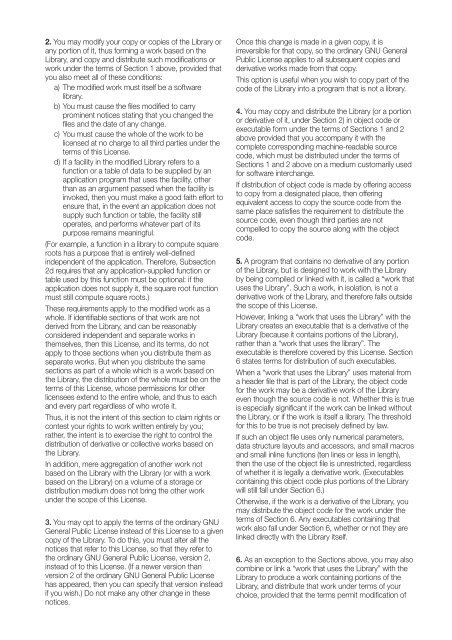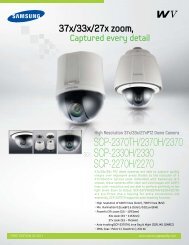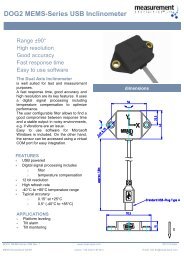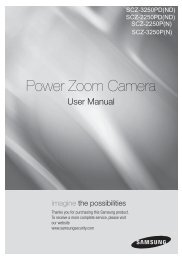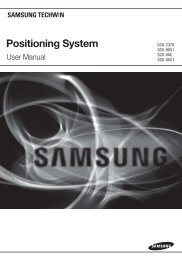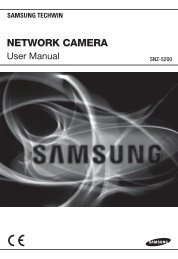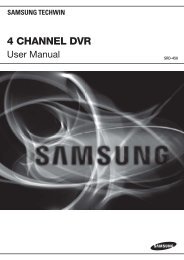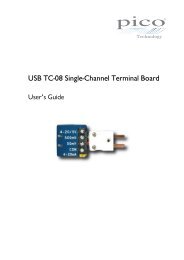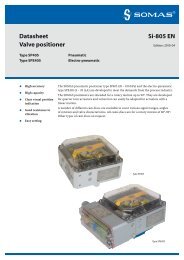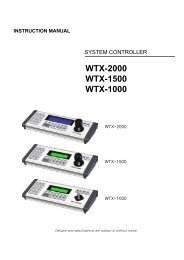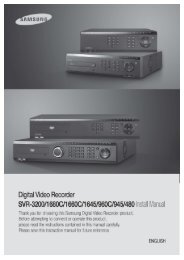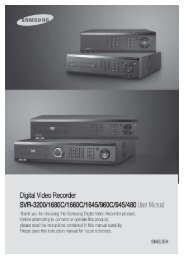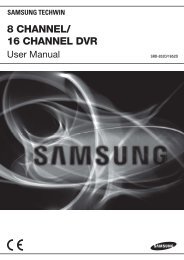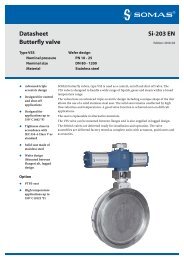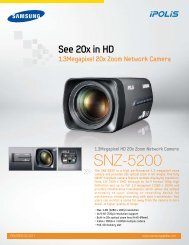User Manual Samsung SRD-470D/470DC DVR
User Manual Samsung SRD-470D/470DC DVR
User Manual Samsung SRD-470D/470DC DVR
Create successful ePaper yourself
Turn your PDF publications into a flip-book with our unique Google optimized e-Paper software.
2. You may modify your copy or copies of the Library orany portion of it, thus forming a work based on theLibrary, and copy and distribute such modifications orwork under the terms of Section 1 above, provided thatyou also meet all of these conditions:a) The modified work must itself be a softwarelibrary.b) You must cause the files modified to carryprominent notices stating that you changed thefiles and the date of any change.c) You must cause the whole of the work to belicensed at no charge to all third parties under theterms of this License.d) If a facility in the modified Library refers to afunction or a table of data to be supplied by anapplication program that uses the facility, otherthan as an argument passed when the facility isinvoked, then you must make a good faith effort toensure that, in the event an application does notsupply such function or table, the facility stilloperates, and performs whatever part of itspurpose remains meaningful.(For example, a function in a library to compute squareroots has a purpose that is entirely well-definedindependent of the application. Therefore, Subsection2d requires that any application-supplied function ortable used by this function must be optional: if theapplication does not supply it, the square root functionmust still compute square roots.)These requirements apply to the modified work as awhole. If identifiable sections of that work are notderived from the Library, and can be reasonablyconsidered independent and separate works inthemselves, then this License, and its terms, do notapply to those sections when you distribute them asseparate works. But when you distribute the samesections as part of a whole which is a work based onthe Library, the distribution of the whole must be on theterms of this License, whose permissions for otherlicensees extend to the entire whole, and thus to eachand every part regardless of who wrote it.Thus, it is not the intent of this section to claim rights orcontest your rights to work written entirely by you;rather, the intent is to exercise the right to control thedistribution of derivative or collective works based onthe Library.In addition, mere aggregation of another work notbased on the Library with the Library (or with a workbased on the Library) on a volume of a storage ordistribution medium does not bring the other workunder the scope of this License.3. You may opt to apply the terms of the ordinary GNUGeneral Public License instead of this License to a givencopy of the Library. To do this, you must alter all thenotices that refer to this License, so that they refer tothe ordinary GNU General Public License, version 2,instead of to this License. (If a newer version thanversion 2 of the ordinary GNU General Public Licensehas appeared, then you can specify that version insteadif you wish.) Do not make any other change in thesenotices.Once this change is made in a given copy, it isirreversible for that copy, so the ordinary GNU GeneralPublic License applies to all subsequent copies andderivative works made from that copy.This option is useful when you wish to copy part of thecode of the Library into a program that is not a library.4. You may copy and distribute the Library (or a portionor derivative of it, under Section 2) in object code orexecutable form under the terms of Sections 1 and 2above provided that you accompany it with thecomplete corresponding machine-readable sourcecode, which must be distributed under the terms ofSections 1 and 2 above on a medium customarily usedfor software interchange.If distribution of object code is made by offering accessto copy from a designated place, then offeringequivalent access to copy the source code from thesame place satisfies the requirement to distribute thesource code, even though third parties are notcompelled to copy the source along with the objectcode.5. A program that contains no derivative of any portionof the Library, but is designed to work with the Libraryby being compiled or linked with it, is called a “work thatuses the Library”. Such a work, in isolation, is not aderivative work of the Library, and therefore falls outsidethe scope of this License.However, linking a “work that uses the Library” with theLibrary creates an executable that is a derivative of theLibrary (because it contains portions of the Library),rather than a “work that uses the library”. Theexecutable is therefore covered by this License. Section6 states terms for distribution of such executables.When a “work that uses the Library” uses material froma header file that is part of the Library, the object codefor the work may be a derivative work of the Libraryeven though the source code is not. Whether this is trueis especially significant if the work can be linked withoutthe Library, or if the work is itself a library. The thresholdfor this to be true is not precisely defined by law.If such an object file uses only numerical parameters,data structure layouts and accessors, and small macrosand small inline functions (ten lines or less in length),then the use of the object file is unrestricted, regardlessof whether it is legally a derivative work. (Executablescontaining this object code plus portions of the Librarywill still fall under Section 6.)Otherwise, if the work is a derivative of the Library, youmay distribute the object code for the work under theterms of Section 6. Any executables containing thatwork also fall under Section 6, whether or not they arelinked directly with the Library itself.6. As an exception to the Sections above, you may alsocombine or link a “work that uses the Library” with theLibrary to produce a work containing portions of theLibrary, and distribute that work under terms of yourchoice, provided that the terms permit modification of


